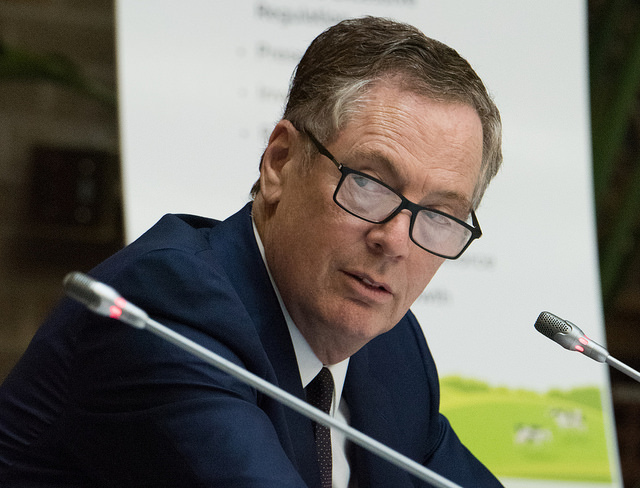
US utility firm NextEra Energy has questioned the motives of the two Section 201 petitioners, Suniva and SolarWorld, and warned the foreign-owned US-based manufacturers could not hope to meet domestic demand.
The company’s senior VP for development, Michael O’Sullivan, was among those providing testimony for the US Trade Representative (USTR) in the final phase of the 201 trade case. The USTR is appointed by the President making Wednesday’s hearing significant. President Trump will make the final decision on what action to take in the case before the end of January after the ITC made its own recommendations last month.
Try Premium for just $1
- Full premium access for the first month at only $1
- Converts to an annual rate after 30 days unless cancelled
- Cancel anytime during the trial period
Premium Benefits
- Expert industry analysis and interviews
- Digital access to PV Tech Power journal
- Exclusive event discounts
Or get the full Premium subscription right away
Or continue reading this article for free
“Quite simply, the tariff levels proposed in the ITC’s Recommendations are too high to support utility-scale projects, the overwhelming driver of solar demand in the United States in recent years,” NextEra stated in a document to accompany its testimony.
“These projects will support thousands of skilled US construction jobs. More generally, solar employment has been growing rapidly and represents one of the fastest-growing sources of skilled, high-wage, blue-collar, US construction jobs, including a significant percentage of veterans of the Iraq and Afghanistan wars. These veterans and their families do not deserve to have their jobs and livelihoods threatened to benefit two small, foreign-owned companies and their hedge fund and foreign owners and creditors who are out for a financial windfall,” it continued.
Claims that an increase in the cost of importing modules is going to kill demand have been sensationalized and historically proven to be wrong
The crux of the argument lies in the impact that very high tariffs could have on project economics. NextEra has said it will invest US$15 billion in renewable energy by 2020.
Suniva’s executive vice president challenged this assertion in his own testimony.
“Claims that an increase in the cost of importing modules is going to kill demand have been sensationalized and historically proven to be wrong,” he said in reference to the two previous anti-dumping cases in the US. “However, what is really at stake for our opponents is not demand, but rather the market distortion that is the fruit of the poisoned tree of Chinese subsidies and IP theft.”
Suniva has also circulated a list of investments made by foreign companies as it sought to question the Solar Energy Industries Association (SEIA) claim to represent the US industry after the trade body issued what it called an “America First” solar plan.
NextEra stated that regardless of the impact on demand, US companies certainly could not provide the required supply. As evidence, it pointed out the absence of details on how the companies would serve the market once tariffs are in place. Suniva’s hands are somewhat tied by its ongoing Chapter 11 bankruptcy case and small scale capacity.
“These two companies have failed to understand and thus have failed to adapt to the needs of the utility-scale solar industry,” said NextEra. “That Petitioners have not submitted an adjustment plan only underscores their lack of any real interest in investing the large amounts of additional capital required to manufacture on a sufficient scale to supply the utility-scale solar market. The lack of any adjustment plan by SolarWorld and Suniva at this important juncture in a Section 201 proceeding must be viewed with a high degree of skepticism, since the entire purpose of the statute is to promote a positive adjustment to imports.”






